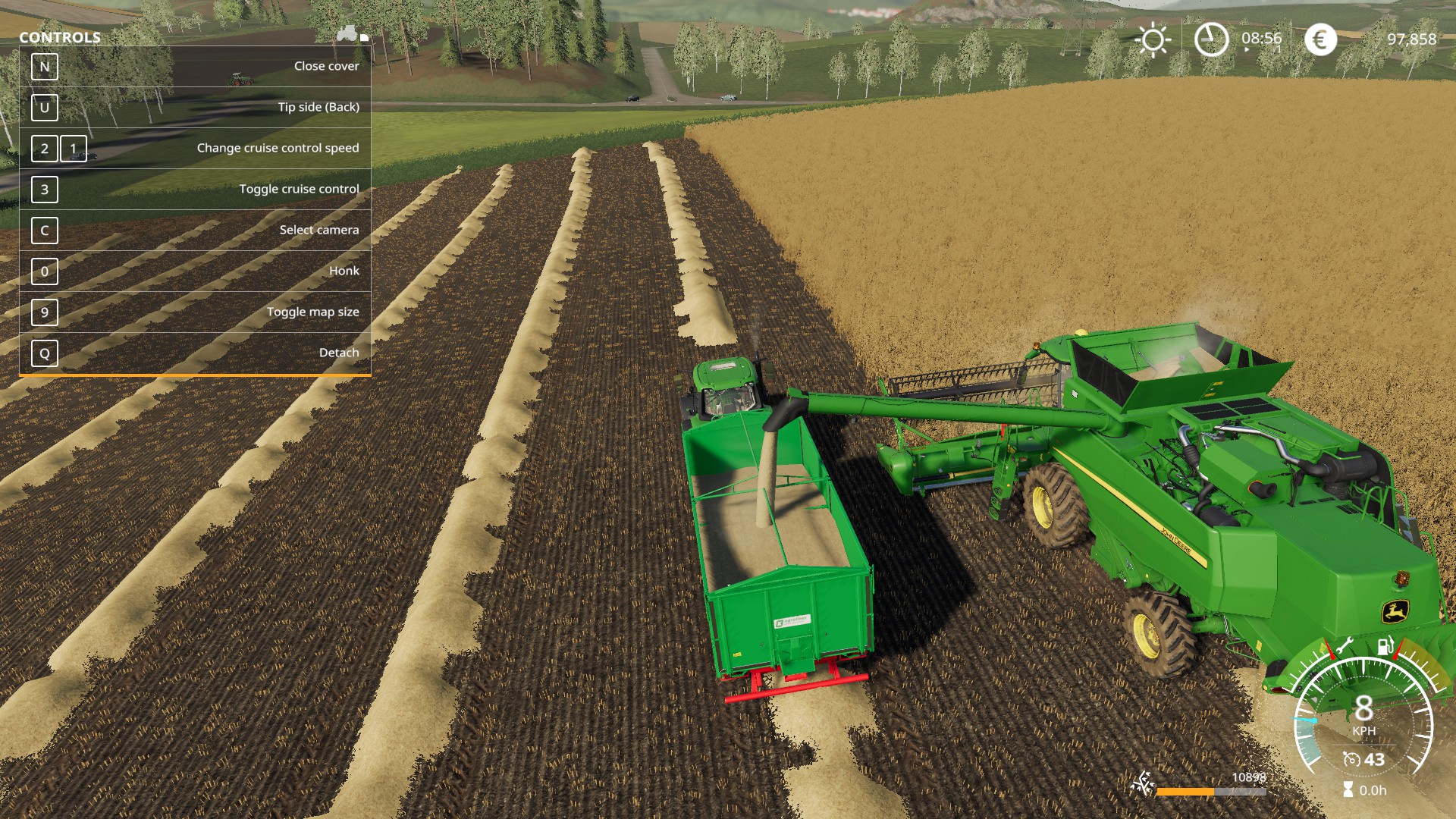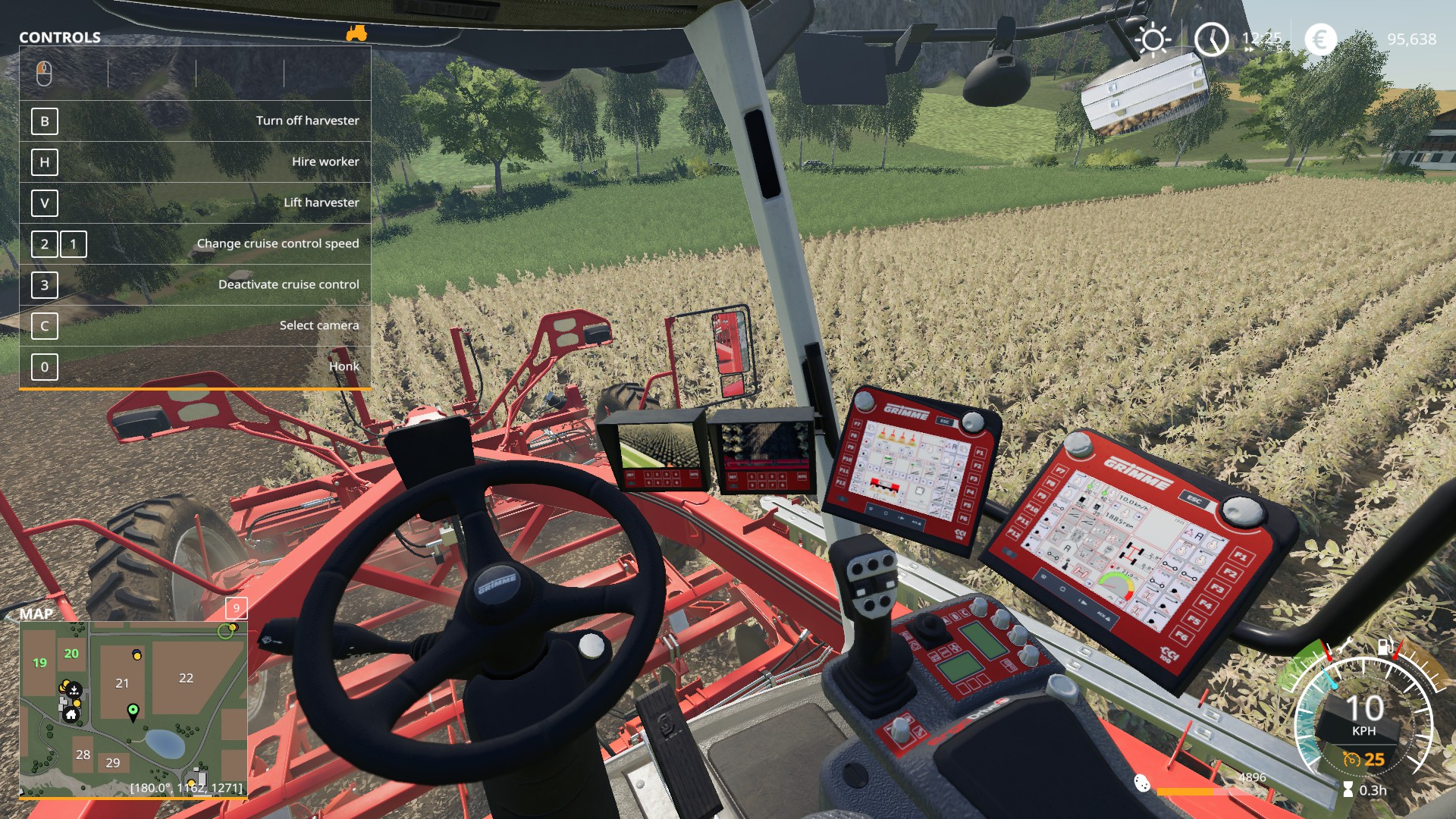
We take much of our lives for granted. So long as the Wi-Fi stays on, nobody questions the machinations behind the scenes. Water magically appears from the faucet, electricity resonates with voodoo energy from holes in the wall, and the food we buy from Woolies never came from anywhere. If that whole needle fiasco was anything to go by, maybe it’s time we took a step back and reassessed a few things. It’s time we thought about farming again, going back to basics, living the good life on the terms we want. Who knows; it might be an opportunity to become more in touch with ourselves and appreciate life without the constant stream of Twitter, Facebook and Youtube clogging our thoughts. We could grow to become more in touch with ourselves, others, and even the cosmos we naively inhabit. That said, farming is not an exciting vocation, and Farming Simulator nails the occupation’s monotony.

The tedium involved in running a farm remains as dull as ever. To successfully harvest a crop, you need to cultivate, fertilise and weed your fields, occasionally spreading lime to keep the soil more alive than you. Each step in the cycle is about as exhilarating as nursing a small rock back to full health, but deep down you know he’ll never swim again. It’s all so drawn out and monotonous that you have to let your mind wander to keep your sanity in check, because nothing here will grab your attention. Unless you’re into doing the same tedious tasks over and over again as your brain shrivels up, you can avoid Farming Simulator altogether, but the game isn’t void of worth.
While Farming Simulator does little to steal your attention, it provides an experience that can produce satisfying results. The game doesn’t give you a strict victory condition to strive for, opting instead to let you roam around and grow your farm as you see fit. The ‘clear your debt’ goal from FS17 has been replaced with three open-ended sandbox modes, ranging from tutorial to struggling Queenslander. You don’t want to be drowning in debt, but the game doesn’t tell you what your next move should be. Each decision is yours and yours alone, which makes the payoff from harvests and contracts that much more satisfying to receive. Being allowed to achieve a goal however you want and mastering the process along the way is a sentiment that resonates with me, but it begs the question: what’s the point?

Since the game lacks a strict goal, it’s hard to justify spending one’s time farming. To what end do you suffer through this monotonous sea of boredom? To buy more virtual land to be bored in slightly longer stints? Why do we do anything? Playing a game like Farming Simulator comes with the acceptance that you want to farm, so maybe your goal is to farm more. Don’t get me wrong, I’m not a fan of cyclical logic, but farming for farming’s sake is the appeal of Warframe, Monster Hunter and most MMO’s. It taps into something primal and exhilarating, that little nook in your brain dedicated to self-efficacy and creating meaning from correlated events. With each harvest, you can look back on your work with pride, even if it looks like a uterine infection.
It’s never the appearance that matters most to us, and Farming Simulator leans into that mentality. Even with a (supposed) revamped graphics engine, FS19 looks about as terrible as other entries in the series. Vehicles can have absurd amounts of detail to them, but the environments and crops will require more imagination from the viewer to fully appreciate. Mind you; people can love the most aesthetically displeasing things, like those grandparents you see on the news who’ve been married for 70 years. The graphics take some getting used to, much like the wrinkles on your favourite tattoo, but you can always look somewhere else for stimulation.

There are plenty of ways to be a farmer in the game, and it all depends on how you want to set up your land. You can be a typical crop farmer, set aside room for some pigs, get in on the lumber game or stick to contract work. The cliché of variety being some Dune-esque currency related to our mortal condition may seem contrived, but it’s the promise of choice that keeps dreams alive. Drawing purpose from the game relies on you deciding what is most important, but it’s a lot easier to figure that out than in real life. These systems can play off of each other too, like using your wheat to feed your chickens. It’s that kind of holistic design that can make the gameplay deeper than you’d initially think, though it won’t go very far.
Farming Simulator lacks the depth of many other games. While you can time selling your harvest or calculate the most efficient product to farm, you’re not going to go much deeper than that. It’s always nice when a hobby of yours, whether it’s gaming or guitar, provides ever-more secrets to be uncovered. The problem is that the activities on offer lack the complexity for strategy, so there’s not much payoff for engineering your approach. Whether you farm chickens or sunflowers is irrelevant (which Nietzsche would love to hear), and the game’s longevity suffers as a result. Complexity can provide challenge, richness and meaning to the experience, but the game is so content on simplifying these processes that it becomes frustrating.

The most annoying part of all this is that the game included some more realistic mechanics. If you drive over your crops, they’ll be destroyed, like most of us. You’ll also need to occasionally weed your fields to keep harvests high because maintenance is an unavoidable phantom waiting for you to mess up. Life has its ups and downs, and these mechanics help with the latter, but they’re still shallow additions that don’t take much thought to overcome. The game will make you realise how life has tempered you to draw excitement from hindrances, but there’s not much significance in the game’s obstacles. Again, the game feels more like a background task than something to dig your teeth into, but that’s not bad.
Not having to look at the screen as your vehicle drives along gives you time to think. You start to ponder meaningful questions, the kind that only podcasts can answer. Are we, as a species, capable of overcoming our evolutionary hindrances while still achieving fulfilling experiences? Have we become so disconnected from the base act of farming that we can no longer appreciate the process? Well, yeah, obviously, but you could listen to Neo Scum instead. The game’s great for keeping your hands busy without occupying too much of your thoughts, so better to fill it with someone else’s than getting distracted by the little fatalist in your head.

Farming Simulator might not be the most exciting game, but it’s not without virtue. Vehicles can be impeccably modelled, the gameplay frees up space in your mind, and harvesting large swathes of grain can be satisfying. Those moments of joy are few and far between, though, and only the most dedicated farmer could take FS19 as a standalone experience without being consumed by Kantian levels of apathy. Perhaps I’m too cynical to appreciate the simple act of creating food in a virtual sense, calloused by the constant stimulation that the internet and games provide me. On the other hand, it could just be that farming is super dull.











